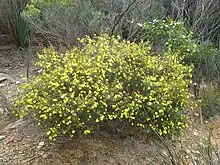| Hibbertia gracilipes | |
|---|---|
 | |
| Scientific classification | |
| Kingdom: | Plantae |
| Clade: | Tracheophytes |
| Clade: | Angiosperms |
| Clade: | Eudicots |
| Order: | Dilleniales |
| Family: | Dilleniaceae |
| Genus: | Hibbertia |
| Species: | H. gracilipes |
| Binomial name | |
| Hibbertia gracilipes | |

Habit on the east side of East Mount Barren
Hibbertia gracilipes is a species of flowering plant in the family Dilleniaceae and is endemic to the south-west of Western Australia. It is an erect, multi-stemmed shrub that typically grows to a height of 15–60 cm (5.9–23.6 in). It blooms between March and December producing yellow flowers.[2] First formally described in 1863 by George Bentham in Flora Australiensis,[3][4] the specific epithet (gracilipes) means "thin foot", referring to the peduncles.[5]
This species is found in the Avon Wheatbelt, Coolgardie, Esperance Plains, Jarrah Forest and Mallee biogeographic regions in the south-west of Western Australia where it grows on rocky hillsides and sandplains.[2]
See also
References
- ↑ "Hibbertia gracilipes". Australian Plant Census. Retrieved 18 June 2021.
- 1 2 "Hibbertia gracilipes". FloraBase. Western Australian Government Department of Biodiversity, Conservation and Attractions.
- ↑ "Hibbertia gracilipes". APNI. Retrieved 18 June 2021.
- ↑ Bentham, George; von Mueller, Ferdinand (1863). Flora Australiensis. Vol. 1. London: Lovell Reeve & Co. pp. 28–29. Retrieved 18 June 2021.
- ↑ Sharr, Francis Aubi; George, Alex (2019). Western Australian Plant Names and Their Meanings (3rd ed.). Kardinya, WA: Four Gables Press. p. 209. ISBN 9780958034180.
This article is issued from Wikipedia. The text is licensed under Creative Commons - Attribution - Sharealike. Additional terms may apply for the media files.